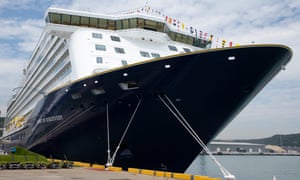Throughout July, easyJet has been running adverts declaring that the continental holiday destinations upon which it relies are “EurOpen”. Unfortunately for the airline and the wider travel industry, Her Majesty’s government has other ideas.
As of last week, the Foreign Office is advising against non-essential travel to Spain, amid nascent signs of a second wave of coronavirus infections. So suddenly was the measure imposed that even the holidaying transport secretary, Grant Shapps, managed to get caught out by it.
Sunbathers on the Costa del Sol or culture vultures wandering the back streets of Barcelona were told they would have to quarantine for 14 days upon their return. Tour operators Tui and Jet2 cancelled holidays, with the latter advising customers to either cut their trip short or fly home with someone else.
Nor is Spain the only holiday hotspot affected. The government has said extra precautions could be extended to other countries at any time, meaning anyone who books a trip abroad must reckon with the possibility that it might be cancelled.
Last week, Tui also announced the closure of 166 of its shops, as it battles for survival. Its once-great competitor Thomas Cook succumbed to its debts even before coronavirus hit, with its 555 high street travel agencies bought by private company Hays Travel.
However, even amid the uncertainty of lockdown, husband-and-wife duo John and Irene Hays were cautiously optimistic in April that they could keep the majority of those shops alive and avoid cutting jobs. Accounts filed at Companies House on Friday show the business still made a profit of £3.4m, even after the £7.4m outlay on Thomas Cook.
Now, with Spanish breaks suddenly taken off the table and the rest of Europe at risk, the prognosis has worsened considerably. “The events of last weekend have changed the dynamic,” said John Hays. “We’ve got 5,000 people working for us and all options are back on the table. Redundancies would always be a last resort for us but there’s obviously a big cloud over things at the moment.”
The major headache for tour operators is that the government has responded to regional increases in Spain by imposing blanket advice against travel to the entire country. That means they cannot mitigate the effect by diverting travellers towards destinations where infection rates remain low.

Fed-up sunseekers are increasingly choosing to defer holiday decisions indefinitely rather than rebook for a later date. In late April, about 70% of Hays’s customers were rescheduling cancelled holidays, and that rate has fallen to 40% since the government’s advice last week. New bookings were running at about 50% of 2019 levels back in April, but have now slumped to 24%. Unless something changes, this makes for a bleak future.
“What the industry is asking for is a more sophisticated approach,” said John Hays. “Tenerife is further away from Barcelona [the centre of a regional outbreak] than London is. The industry is saying that where you’ve got islands like that with rates of infection lower than the UK’s, people should be allowed to fly there and have their holidays.”
Even before the tightening of travel restrictions, the picture was grim. Abta, the travel industry trade body, has a page on its website listing the companies that have failed recently, usually a relatively rare occurrence. It lists seven since late May alone.
The pandemic cost the global travel industry close to £250bn between January and May, three times the industry’s total bill for the global financial crisis of 2008, figures from the UN World Tourism Organisation showed last week.
According to analysis by the Observer, nearly £25bn has been wiped off the stock market value of travel-reliant firms with shares listed in London during 2020. The casualties include airlines such as Ryanair and easyJet, hotel groups such as IHG, and cruise operator Carnival.
British Airways’ owner, IAG, had already said it would cut 12,000 jobs, and followed that up on Friday with plans to ask investors for £2.5bn in new funds, after suffering a record half-year loss of £3.8bn.
Rival Virgin Atlantic required a £1.2bn injection arranged by billionaire founder-owner Sir Richard Branson, who funded it from new investment and his own money after failing to secure any taxpayers’ cash.
Aviation pundits fear that the worst may be yet to come, particularly after the global air travel body Iata responded to weaker-than-expected data last week by pushing back the expected date of the industry’s recovery from 2023 to 2024.
John Strickland, director of independent transport consultancy JLS Consulting, is fairly despondent about the near-term prospects for UK and Irish airlines, with business passengers unlikely to pick up the slack from tourism. “I don’t think the existential threat has even arrived yet,” Strickland said. “Autumn and winter are weaker times and the expectation for business travel, which normally picks up coming out of the summer period, is that it won’t come back much, if at all.
“Companies have travel bans in place for reasons of health security or cost saving, and we will likely see greater use of video conferencing in place of travel. Of course, some companies will simply have failed outright.”
Governments across Europe have bailed out their major national airlines; Lufthansa even declared that the €9bn it got from Berlin was more than it actually needed. British and Irish airlines have had no such luck.
“We’ve got some of the fittest airlines, with good cash resources, in the UK, but all of them are having to aggressively manage their cost bases, and in aviation, cash burns at a rate of millions a day,” said Strickland.
“So it does make for a more difficult competitive environment if others are being supported by governments. The government has not adequately recognised the value of the industry, not only as a direct employer but as an essential catalyst for tourism and as an enabler for business and cargo, as well as supporting thousands of jobs in the supply chain.”

However, pockets of the travel industry are putting on a brave face. Cruise passengers are notoriously hardy folk – their appetite for life on the open wave has proved resistant to bouts of norovirus, bad weather and even high-profile disasters such as the Costa Concordia.
Saga Cruises is still planning to take delivery of its newly built ship, the Spirit of Adventure, in the autumn. The vessel’s arrival was delayed by the effects of the pandemic on the German shipyard where it was built. But Saga is planning its first commercial voyage in November and is already taking bookings – up to a capacity of 999 passengers – for the ship’s maiden season.
There may even be some pandemic “winners” – or at least those who lose least – among companies offering UK holidays. Luxury lodges firm Hoseasons broke its booking record after the prime minister announced the lifting of lockdown restrictions.
Center Parcs, although it is operating at only 65% occupancy, said it had seen “strong interest”, particularly for this autumn, while caravan and camping group Haven witnessed a 70% increase in web traffic last week as more routes to Europe were closed off.
The Link LonkAugust 01, 2020 at 10:00PM
https://ift.tt/2EGKQhe
Holiday firms can’t get a break as quarantines crush faint recovery - The Guardian
https://ift.tt/2QoXNjh
Holiday

No comments:
Post a Comment